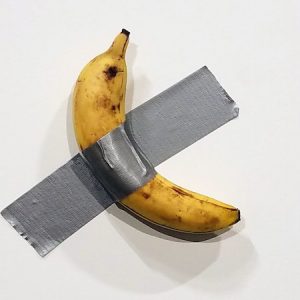It was of no karmic significance that Art Basel Miami Beach, arguably the nation’s premier art fair, opened soon after the UN published its latest climate report. The two were entirely unrelated. Nevertheless, global warming might have been a central theme at the annual extravaganza, which claims to feature the “highest quality” contemporary art, given the threat it presents. The UN report underscored the point, warning that dramatic action is required to limit the worst impacts of rising temperatures.
Alas, no.
Instead, the work of more than 4,000 artists on display at the Miami Beach Convention Center in December comprised the banal bric-a-brac found in galleries the world over: miscellaneous objects mounted on pedestals, canvases festooned with splattered paint, and, in one case, an arrangement of chairs and a desk that also served as a place to sign paperwork. It “captured our hearts no less,” a critic gushed.
But it was a banana, or, more precisely, a banana affixed to a wall with duct tape, that caused a particular stir. Culture vultures flocked. Selfie-seekers swooned. Such was the frenzy that, to protect nearby artwork from the onslaught, the banana was removed, though not before a self-described “hungry artist” ate an earlier iteration, pronouncing it “delicious.”
The Italian artist Maurizio Cattelan, best known for his fully functional toilet cast in gold that was displayed at New York’s Guggenheim museum, was responsible for the high-potassium installation, entitled “Comedian.” An edition of three bananas that came with certificates of authenticity and assembly instructions sold for up to $150,000 each, or the equivalent of about 775,996 bananas at current market rates.
This may sound like satire, but it’s not. Art Basel Miami Beach, or what some call the “Running of the Billionaires,” is the genuine article. Which is to say, it’s big business, spawning a host of corporate-sponsored spin-offs from the likes of Gucci and the NBA. No surprise, then, that those vapid exemplars of carefree consumerism, the Kardashians, often visit Miami during the fair. Fittingly, one was seen this year at the opening of a bar with a theme harkening to pre-revolutionary Havana, an era defined by corruption and greed.
Lamenting art’s commercialization may seem pointless. After all, art, like any product bought and sold in the marketplace, is treated like a commodity whose “value” is determined by the law of supply and demand. In this way, it differs little than securitized debt obligations or pork bellies. Artistic merit is beside the point.
Art Basel Miami Beach is just one example of this. Take literature. This year’s fiction bestsellers featured recycled potboilers, including the 19th and 49th installments of two longstanding series. It was more of the same at the box office. Three of the four highest-grossing films worldwide in 2019 were reprocessed superhero sagas. A steel replica of a toy rabbit, meanwhile, was sold at an art auction in May for a record-setting $91 million.
Yet the marketplace is not the only barometer that matters when it comes to art, which is more than a commodity to be bought and sold like any other. Art has a particular role. As Pablo Picasso observed, “Art is a lie that makes us realize truth.” It illuminates, reveals. It elevates, ennobles. It beautifies, decorates. It tells us about ourselves. A commodity that is only a commodity, like a banana fastened to a wall with duct tape, does none of this. It tells no truth; it’s just a lie.
All this may be beside the point when we can afford to blind ourselves to uncomfortable truths, but these are no such times. Climate change, for one, comprises a grave threat, though many others exist. Democracy, for example, is in retreat around the world. It has been for years. Freedom House, an organization that tracks such things, characterizes the backsliding as “consistent and ominous.” This trend is alarmingly clear at home, where our leadership, like that in pre-revolutionary Havana, is corrupt and greedy. Our democracy appears to be hanging in the balance.
However, the arts, broadly defined, largely are absent when it comes to addressing these and other challenges. They’re fiddling as the world burns—literally. Exceptions exist, of course. Some artists are creating work that, in Picasso’s words, helps us realize truth—the very idea of which is under assault. But mostly, the arts take the guise of gimmicky investments for the rich or dumbed-down pastimes for the rest. This should not be. Art should demand more from us and we from it. The stakes are too high.
Such a lofty appeal doubtlessly will fall on deaf ears at Art Basel Miami Beach, where business is great. Why change that which is not broken? Still, the fair’s future might well be imperiled regardless, though not due to commercialism or frivolity. Rather, if climate change goes unaddressed, Florida will be underwater.


Leave a Reply